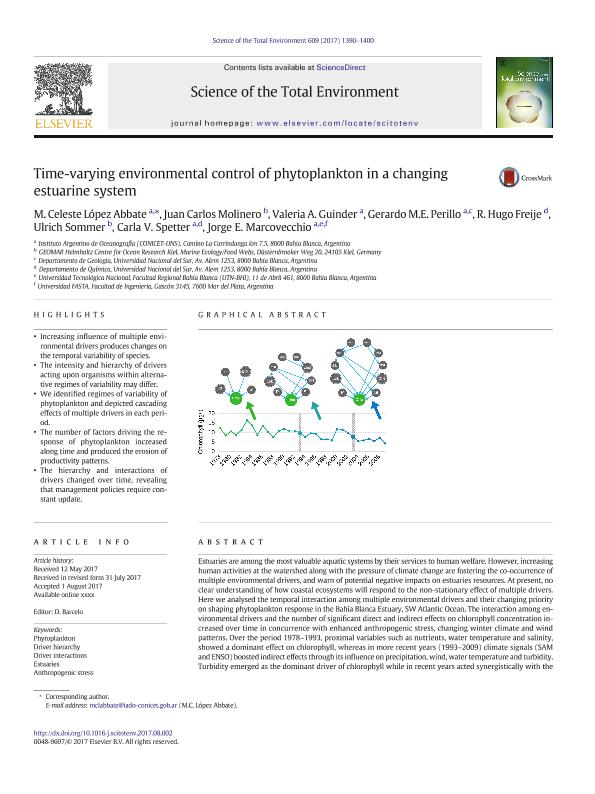Mostrar el registro sencillo del ítem
dc.contributor.author
López Abbate, María Celeste

dc.contributor.author
Molinero, Juan Carlos

dc.contributor.author
Guinder, Valeria Ana

dc.contributor.author
Perillo, Gerardo Miguel E.

dc.contributor.author
Freije, Rubén Hugo

dc.contributor.author
Sommer, Ulrich
dc.contributor.author
Spetter, Carla Vanesa

dc.contributor.author
Marcovecchio, Jorge Eduardo

dc.date.available
2018-12-06T17:19:22Z
dc.date.issued
2017-12
dc.identifier.citation
López Abbate, María Celeste; Molinero, Juan Carlos; Guinder, Valeria Ana; Perillo, Gerardo Miguel E.; Freije, Rubén Hugo; et al.; Time-varying environmental control of phytoplankton in a changing estuarine system; Elsevier; Science of the Total Environment; 609; 12-2017; 1390-1400
dc.identifier.issn
0048-9697
dc.identifier.uri
http://hdl.handle.net/11336/65979
dc.description.abstract
Estuaries are among the most valuable aquatic systems by their services to human welfare. However, increasing human activities at the watershed along with the pressure of climate change are fostering the co-occurrence of multiple environmental drivers, and warn of potential negative impacts on estuaries resources. At present, no clear understanding of how coastal ecosystems will respond to the non-stationary effect of multiple drivers. Here we analysed the temporal interaction among multiple environmental drivers and their changing priority on shaping phytoplankton response in the Bahía Blanca Estuary, SW Atlantic Ocean. The interaction among environmental drivers and the number of significant direct and indirect effects on chlorophyll concentration increased over time in concurrence with enhanced anthropogenic stress, changing winter climate and wind patterns. Over the period 1978-1993, proximal variables such as nutrients, water temperature and salinity, showed a dominant effect on chlorophyll, whereas in more recent years (1993-2009) climate signals (SAM and ENSO) boosted indirect effects through its influence on precipitation, wind, water temperature and turbidity. Turbidity emerged as the dominant driver of chlorophyll while in recent years acted synergistically with the concentration of dissolved nitrogen. As a result, chlorophyll concentration showed a significant negative trend and a loss of seasonal peaks reflecting a pronounced reorganisation of the phytoplankton community. We stress the need to account for the changing priority of drivers to understand, and eventually forecast, biological responses under projected scenarios of global anthropogenic change.
dc.format
application/pdf
dc.language.iso
eng
dc.publisher
Elsevier

dc.rights
info:eu-repo/semantics/openAccess
dc.rights.uri
https://creativecommons.org/licenses/by-nc-sa/2.5/ar/
dc.subject
Phytoplankton
dc.subject
Driever Hierarchy
dc.subject
Estuaries
dc.subject
Anthropogenic Stress
dc.subject.classification
Meteorología y Ciencias Atmosféricas

dc.subject.classification
Ciencias de la Tierra y relacionadas con el Medio Ambiente

dc.subject.classification
CIENCIAS NATURALES Y EXACTAS

dc.title
Time-varying environmental control of phytoplankton in a changing estuarine system
dc.type
info:eu-repo/semantics/article
dc.type
info:ar-repo/semantics/artículo
dc.type
info:eu-repo/semantics/publishedVersion
dc.date.updated
2018-10-22T18:05:40Z
dc.journal.volume
609
dc.journal.pagination
1390-1400
dc.journal.pais
Países Bajos

dc.journal.ciudad
Amsterdam
dc.description.fil
Fil: López Abbate, María Celeste. Consejo Nacional de Investigaciones Científicas y Técnicas. Centro Científico Tecnológico Conicet - Bahía Blanca. Instituto Argentino de Oceanografía. Universidad Nacional del Sur. Instituto Argentino de Oceanografía; Argentina
dc.description.fil
Fil: Molinero, Juan Carlos. Geomar-Helmholtz Centre for Ocean Research Kiel; Alemania
dc.description.fil
Fil: Guinder, Valeria Ana. Consejo Nacional de Investigaciones Científicas y Técnicas. Centro Científico Tecnológico Conicet - Bahía Blanca. Instituto Argentino de Oceanografía. Universidad Nacional del Sur. Instituto Argentino de Oceanografía; Argentina
dc.description.fil
Fil: Perillo, Gerardo Miguel E.. Consejo Nacional de Investigaciones Científicas y Técnicas. Centro Científico Tecnológico Conicet - Bahía Blanca. Instituto Argentino de Oceanografía. Universidad Nacional del Sur. Instituto Argentino de Oceanografía; Argentina. Universidad Nacional del Sur; Argentina
dc.description.fil
Fil: Freije, Rubén Hugo. Universidad Nacional del Sur. Departamento de Química; Argentina
dc.description.fil
Fil: Sommer, Ulrich. Geomar-Helmholtz Centre for Ocean Research Kiel; Alemania
dc.description.fil
Fil: Spetter, Carla Vanesa. Consejo Nacional de Investigaciones Científicas y Técnicas. Centro Científico Tecnológico Conicet - Bahía Blanca. Instituto Argentino de Oceanografía. Universidad Nacional del Sur. Instituto Argentino de Oceanografía; Argentina. Universidad Nacional del Sur; Argentina
dc.description.fil
Fil: Marcovecchio, Jorge Eduardo. Consejo Nacional de Investigaciones Científicas y Técnicas. Centro Científico Tecnológico Conicet - Bahía Blanca. Instituto Argentino de Oceanografía. Universidad Nacional del Sur. Instituto Argentino de Oceanografía; Argentina. Universidad FASTA ; Argentina. Universidad Tecnológica Nacional; Argentina
dc.journal.title
Science of the Total Environment

dc.relation.alternativeid
info:eu-repo/semantics/altIdentifier/url/https://www.sciencedirect.com/science/article/pii/S0048969717320004
dc.relation.alternativeid
info:eu-repo/semantics/altIdentifier/doi/http://dx.doi.org/10.1016/j.scitotenv.2017.08.002
Archivos asociados
